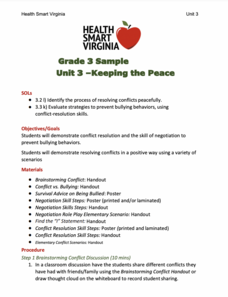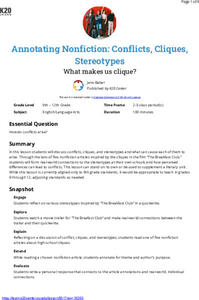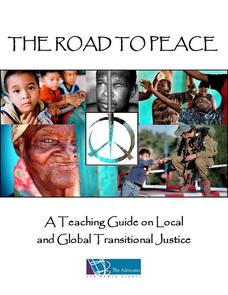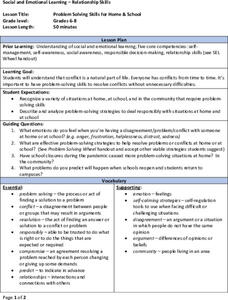Western Justice Center
Culture and Identity
To conclude a study of conflict resolution, class members watch and discuss a series of five videos that frame the conversation in terms of culture and identity, understanding bias, oppression, and interpersonal biases.
Missouri Department of Elementary
Conflict Mediation – Part 2: Practice
A lesson challenges scholars to prove their understanding of conflict mediation. Small groups role-play scenarios using two mediators and two disputants. Peers observe then discuss their findings. A worksheet outlines groups'...
Learning for Life
Anger/Conflict Management
What is anger? Why do we become angry, and how can we control it? Help young learners develop an important life skill in the ability to process and handle angry emotions with this simple guided activity and worksheet.
Missouri Department of Elementary
My Problem…Your Problem…Our Problem
Encourage sixth graders to take responsibility for their actions and become a problem solver. Pupils discuss new problems faced in sixth grade then identify ones that involve other people. A worksheet guides their practice in conflict...
Missouri Department of Elementary
Talk it Over and Work It Out: Compromise!
Stop, Think, Act, Review! Scholars use the STAR method to role play two conflict resolution scenarios about childhood problems such as jealousy or cheating. Then, the larger group judges each case to determine if the compromise is a...
Missouri Department of Elementary
Tic Tac Toe, Get Off My Toes
Why is conflict resolution such an important skill to learn? Pupils explore the topic, playing an adapted Tic-tac-toe game. Two class teams are tasked with finding a win-win solution to a hypothetical conflict before adding their X or O...
Health Smart Virginia
Keeping the Peace
A lesson examines ways young learners can keep the peace with conflict resolution. Scholars share a conflict then discuss the difference between conflicts and bullying. Pupils read scenarios and practice their negation skills.
Overcoming Obstacles
Creating a Win-Win Situation
Win-lose? Lose-lose? or Win-win? The activities and games in the fifth lesson in the Resolving Conflicts module teach middle schoolers how they might use their problem-solving skills to transform a conflict into a win-win solution.
K20 LEARN
Annotating Nonfiction - Conflicts, Cliques, Stereotypes: What Makes Us Clique?
John Hughes' The Breakfast Club takes center stage in a lesson about annotating nonfiction texts to keep track of evidence that may be used later in discussions and writings. Scholars consider the stereotypes and conflicts presented in...
Overcoming Obstacles
Creating a Win-Win Situation
As part of a study of ways to resolve conflicts, class members examine the characteristics of win-win solutions and then practice win-win negotiations. They also examine the role of a mediator in conflict resolution and then script and...
Advocates for Human Rights
A Teaching Guide on Local and Global Transitional Justice
The Road to Peace introduces learners to the concept of transitional justice, a process where nations examine the causes of conflict, identify abuses, and use this information to develop a plan to transition to a society that upholds...
Western Justice Center
Negotiation
When to negotiate and when not to negotiate, that is the question at the heart of this conflict resolution instructional activity. Class members watch a short video about negotiation tools, read an article about negotiation tips, and...
Western Justice Center
Self Awareness
Being aware of one's perceptions and biases is especially important when involved in a conflict. After watching an introductory video and four scenarios, viewers write out how they would feel or react to each situation. The subsequent...
Overcoming Obstacles
Uncovering Stereotypes
The second lesson in the "Resolving Conflicts Module" teaches participants how to avoid stereotyping and how to look for common ground with those with opposing views.
Constitutional Rights Foundation
The Iran Nuclear Deal and Its Critics
What was the purpose of the Iranian Nuclear Deal? An insightful resource explains nuclear tensions in the Middle East and Iranian weapon development that contributed to the Nuclear Deal in 2013. Academics learn the agreement limited...
Western Justice Center
Underlying Needs
Conflicts arise when underlying needs are unmet. An engaging video introduces viewers to nine basic human needs. Then, through a series of videos, worksheets, and activities, class members learn that by focusing on interests and needs,...
Western Justice Center
Emotions, Regulation Strategies
To regulate emotions in a conflict it is first necessary to be able to identify those emotions. To that end, class members engage in a series of activities, watch a series of videos, and compete worksheets that help them understand and...
Education Foundation of Sarasota County
Problem Solving Skills for Home and School
Dr. Seuss' The Zax has a lesson plan to teach tweens and teens about the importance of problem-solving skills. After viewing the short video, groups identify conflicts that may occur at home, in school or in the community. They then...
Overcoming Obstacles
Using Communication Skills Effectively
Miscommunication is often the basis of conflict. To improve their communication skills, pupils first review what they learned about assertive (as opposed to aggressive or passive) communication, role-play several scenarios, and then...
Nemours KidsHealth
Getting Along: Grades 3-5
Two lessons boost social awareness and spread gratitude. In the first lesson plan, scholars write a newspaper article that describes a conflict and ways to solve it. In the second lesson plan, pupils offer kindness coupons to family and...
WE Charity
Exploring the Four Leadership Styles
What is your leadership style? Tweens and teens independently complete a Four Leadership Styles worksheet. Once completed, they use a leadership code to identify their prominent leadership style. Class members gather by style, brainstorm...
Ashoka
A Toolkit for Promoting Empathy in Schools
Instill kindness with a unit all about empathy. Lessons and activities follow a prepare, engage, reflect, and action sequence. Learning experiences include making the classroom a safe environment, peer-invented handshakes, discussions...
Health Smart Virginia
Relationship Skills and Communication
Relationship and communication skills are the heart of a lesson that focuses on passive, aggressive, and assertive communication. After examining examples of each type, teams develop an assertive, win/win solution that resolves a conflict.
Health Smart Virginia
Sporting Behavior
Six small groups perform skits that showcase positive sporting behavior. Actors highlight how players try their best, encourage others, win gracefully, think positively, show respect, and resolve conflict. A class discussion and an Exit...
Other popular searches
- Conflict Resolution Game
- Conflict Resolution Role Play
- Plot Conflict Resolution
- Conflict Resolution Styles
- Conflict Management Games
- Conflict Management Bullying
- Conflict Resolution Plays
- Conflict Management Videos
- Conflict Management Skills
- Conflict Management Lessons
- Conflict Resolution Skills
- Peer Conflict Resolution

























